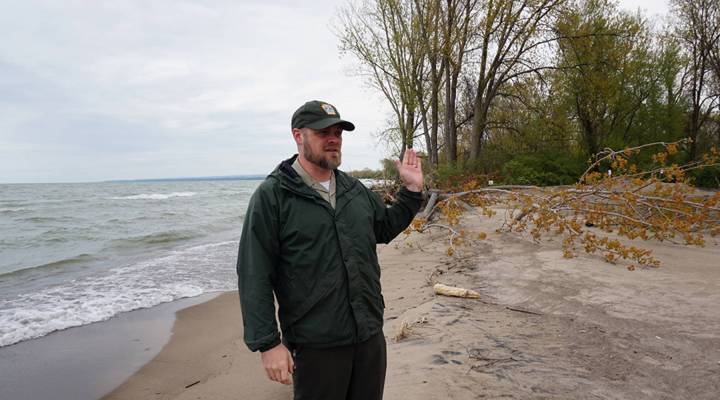
Erie worries its natural beauty — and tourism — will suffer under budget cuts
Erie worries its natural beauty — and tourism — will suffer under budget cuts

President Trump pledged sweeping political and economic changes during the campaign. We have no idea if Trump can deliver on those promises, but we can explore what it’s going to take for him to try. It’s all in our series The Big Promise.
Grapes are big business in Erie — mostly concord grapes. And they’re especially important to the economy of northeast Erie, aka Welch’s country. Mario Mazza’s family has run a winery here since the ’70s. Back then it was pretty lonely for vintners. But things have changed. In the past decade or so, Mazza said not only has his production gone up, visitation to the taprooms has also climbed.
“The business has grown. We’re about fourfold what we were 10 or 12 years ago,” Mazza said, adding that the wine industry has grown, too. “We have a lot of growers that maybe started out primarily as juice grape growers but are diversifying their acreage into having some wine varieties.”
More than 50,000 visitors are expected to descend Erie’s wine country this year to try out the rieslings and cabernets, dine at local restaurants and maybe spend a night in one of the area’s bed and breakfasts.
And then they may head the 20 miles into downtown Erie to stroll across the Bayfront. Along with health care, tourism has become a strong part of Erie’s economy, said John Oliver, the head of VisitErie. He said visitors come to Erie year-round, but the busiest season is summer, or what he calls “the golden 90 days.”
Once the site of an asphalt shingle factory and a rundown pier, the bay front is now home to a modern convention center, a marina full of fancy boats, and a big hotel, with several more on the way. All told, tourists spend more than a billion dollars a year in Erie annually — double what they spent 15 years ago.
| How health care is healing Erie’s ailing economy |
| Rural America weighs the economic realities of proposed federal budget cuts |
| 3 things you may have missed about Trump’s budget |
Politics, which seems to run through everything these days, plays a role in Erie’s tourist economy, too. Lots of visitors come from nearby Canada, and with tighter border regulations called for by the Trump administration, Oliver is worried some Canadians may stay home.
“If you have a delay of an hour just to get into the country because you’re trying to clear additional vetting that they might be doing as you’re trying to cross the border, that’s going to discourage people from coming here,” he said.
Budget cuts proposed by the administration could also have a negative impact on Erie. The area is known for it’s natural beauty and depends on federal dollars and Environmental Protection Agency regulations to keep things beautiful. People want to sit on the bay front and drink that local wine. And they want to go to the beaches at Presque Isle State Park and kayak and canoe in the lake. Or hike in the lush forests. But under the proposed federal budget, the $300 million Great Lakes Restoration Initiative would be slashed.
“Anything that would impact the quality of the water or access to the water through the beaches would be a major concern and could have a really negative impact on the economy for this community, because we are becoming dependent on tourism,” said Oliver, noting that Presque Isle lures 4 million visitors to Erie every year.
Matt Greene, operations manager for the park, said government funds help pay to fight beach erosion and test the water. When manufacturing reigned here, the pollution was so bad, the water wasn’t safe to swim in.
“There’s a very real impact or potential impact with those budget dollars potentially going away. That will inevitably have some impact on the tourism that happens here,” he said.
It hasn’t happened yet. This summer, everyone expects another robust season. It’s next year and the year after that has people worried.
There’s a lot happening in the world. Through it all, Marketplace is here for you.
You rely on Marketplace to break down the world’s events and tell you how it affects you in a fact-based, approachable way. We rely on your financial support to keep making that possible.
Your donation today powers the independent journalism that you rely on. For just $5/month, you can help sustain Marketplace so we can keep reporting on the things that matter to you.












